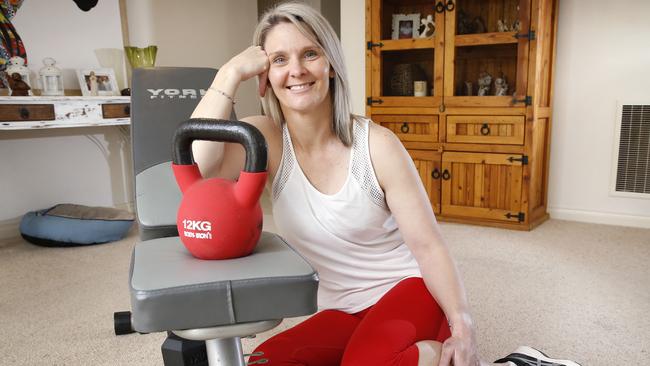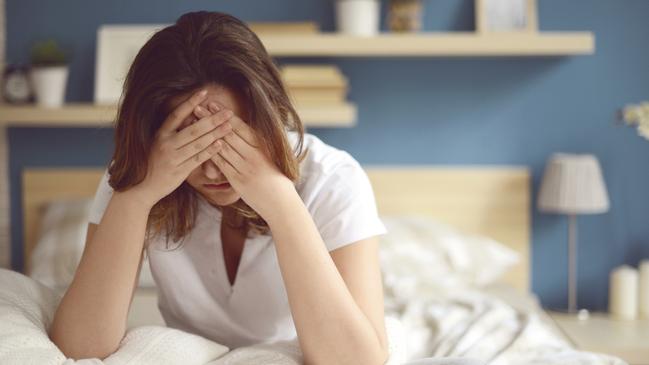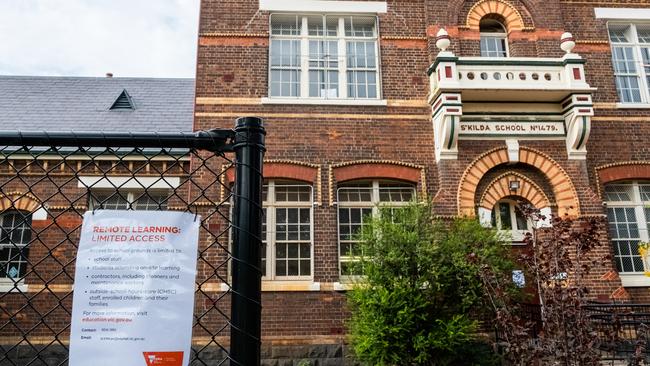Vulnerable Victorians become ‘collateral damage’ during fight against coronavirus
Family violence, heart problems, mental health and alcohol abuse are just some of the issues contributing to the hidden toll of Victoria’s coronavirus battle.
Coronavirus
Don't miss out on the headlines from Coronavirus. Followed categories will be added to My News.
The number of people surviving cardiac arrest during Victoria’s first lockdown dropped to half the usual rate.
It’s a stark reality — and one that is particularly “distressing” to those on the front line.
“It’s pretty confronting, it’s very confronting for those of us working in this to think that because of the response to COVID and the way we have to work, we’d produce less survivors than usual,” Associate Professor Mick Stephenson, Executive Director of Clinical Operations at Ambulance Victoria, says.
“Survival in Victoria is (usually) among the highest of any other place in the world and we’ve taken great pride [in that]. But it’s been impacted dramatically.”
The decline is a direct result of the coronavirus pandemic, with paramedics now required to wear full personal protective gear and take other protective measures — adding about an extra two minutes to their response time.

There’s also been a drop in the number of bystanders performing CPR and using publicly available defibrillators, with less people out on the streets or scared to perform the lifesaving treatment for fear of catching the virus.
“It means that we’ve got a lot of people, about 150-200 if we extrapolate across the whole year, where (survival) will not be the case for them,” Prof Stephenson said.
Mount Martha mum Justine Phillips, 46, suffered a cardiac arrest in July this year.
Her children, aged 14 and 16, found her lying on the bedroom floor, called tripe — 0 and were talked through performing CPR until help arrived.
Ms Phillips, who is a personal trainer, said she was “shocked” but agreed she was proof of just how lifesaving CPR could be.
“I just look back and I can’t believe that it’s happened,” she said.
“If it wasn’t for my kids’ quick action, I wouldn’t be here.”
Prof Stephenson said learning CPR was a vital skill and that could save someone’s life.
He said chest compressions — even from someone who wasn’t trained — were crucial, adding that by gently covering the patient’s mouth with a cloth or T-shirt, the risk of catching COVID-19 could be stopped.
“We think if people do that well continue to save a lot of lives,” he said.
CANCER TREATMENT
Sick and vulnerable Victorians have become “collateral impacts” of the coronavirus pandemic, according to one expert.
Associate Professor Kate Burbury, a haematologist and Chief Medical Officer at the Peter MacCallum Cancer Centre, says many Victorians have been left behind during the pandemic because of confusion — and fears — about accessing healthcare.
“What we’ve missed is creating a business as usual strategy (despite our messaging),” she said.
“Getting that message out should have been pushed out at a community base level … (but) the impositions from above have stopped us from redesigning and co-designing to make our care better.
“Everyday you’re getting up and you feel like you’re walking through mud to do what you need to do.”
As a result, she fears the state will soon see a “surge” in diagnosis and be overwhelmed by patients, especially those needing cancer treatment.
“The patients are out there and they’re not being seen — and time matters when you diagnose cancer,” she said.
“We know that there’s been a reduction somewhere in the realm of 40 to 80 per cent across tumour groups since the pandemic.
“That’s phenomenal – [especially given] the number of cancer diagnosis’s increases every year.”
She said being able to travel, organise transport, bring a support person and fears of catching coronavirus had all played a role in the decline
“There’s definitely been pockets where they’ve never had this low referrals,” she said.
“The restrictive environment that has been imposed upon us … is actually stopping people getting their primary checks with GPs.
It comes as new figures last week revealed lifesaving breast, bowel and cervical screenings in Victoria dropped by between 35 and almost 60 per cent in the first half of the year — likely due to the state’s hard lockdown.
Only 91,607 cervical screenings have been performed this year — compared with 216,079 at the same time in 2019, new statistics released by the Australian Institute of Health and Welfare show.
“We’re almost sitting on the edge of our seat (waiting),” Prof Burbury said.
“I do think there will be a surge in cancer diagnosis.”
She said access to clinical trials had also been impacted, with many lifesaving programs put on hold, or requiring in-person treatment or consultations.
“We need to develop exit strategies, we need to learn to live with the virus because it’s not going away” Prof Burbury said.
“We need to engage and educate the community, not hide away in fear.”
MENTAL HEALTH
Up to six in 10 young Victorians think their mental health and wellbeing is worse off because of the coronavirus, new data shows.
The Foundation for Young Australians has produced a snapshot reflecting mental health and other wellbeing measures across the country.
It shows 55 per cent of young people aged 15 to 24 nationally are concerned about their mental wellbeing in the long term as a result of the virus.
In Victoria the rate is up to 60 per cent in country areas including the Yarra Ranges, the Mornington Peninsula, Gippsland, the Mallee, the High Country, the Macedon Ranges, Whittlesea, Mount Baw Baw, the Bass Coast, Shepparton, Warrnambool and the Southern Grampians.
In most Melbourne areas, 56 per cent of young people are worried about their mental health. In Ballarat, Bendigo and Geelong the rate is 53 per cent.
A joint statement of concern has been released by Dr Tony Bartone from the AMA, Professor Ian Hickie from the Brain and Mind Centre and Professor Patrick McGorry, executive director of mental health service Orygen.
They warn long-term mental health support is needed as the effects of the COVID-19 pandemic is felt across the community.
“We know that young people are going to be disproportionately affected by the COVID-19 pandemic, and the measures that are needed to stop the spread of this deadly disease,” they said.
“The impacts will be greatest among the young, those who live in rural and regional Australia, and in those areas hardest hit by job losses in sectors that will not recover quickly.”
A report from the Victorian Coroner’s Court has found there has not been an increase in suicides compared to last year, despite fears this might be the case.
But health professionals are all reporting a significant growth in the number of patients seeking treatment and support for their mental health.
FAMILY VIOLENCE
Family violence has worsened since the pandemic hit.
Research from the Australian Institute of Criminology found sexual, physical and emotional abuse of women became more severe and frequent during the early stages of the COVID-19 crisis.
Many women also reported the pandemic coincided with the onset of violence against them.
When lockdown restrictions were toughened in July, family violence experts expressed fears women and children would be subjected to a “second wave” of violence.
The pandemic has caused many victims to become isolated from friends and family and under increased surveillance by perpetrators in the home.
The virus has also been weaponised by offenders to control victims.
Domestic Violence Victoria warned perpetrators were stopping family members from leaving the home, hiding essential items such as food and medical documents and even threatening to expose children to the coronavirus.
Factors including financial stress, unemployment, feeling trapped or uncertain about the future have been identified as contributors to the increase or onset of violence in homes.
Victoria Police launched a specialist family violence operation in April to closely monitor high-risk offenders and maintain contact with victims in response to safety fears.
Family Violence Investigation Unit detectives have conducted more than 25,000 checks, including 7380 compliance checks on high risk perpetrators since the launch of Operation Ribbon.
During these visits 6784 family violence offences were detected, including assaults and intervention order breaches.
A total of 1534 people have been arrested, including 853 who were charged and remanded.
Detectives have also spoken to almost 18,000 victims and affected family members as part of the operation.
ALCOHOL
Victorians are drinking more during lockdown – but it’s what comes next that could be even worse.
A national survey carried out by the Alcohol and Drug Foundation Foundation (ADF) in August, after the first wave, found half of those surveyed who drunk more alcohol during lockdown carried on the behaviour when restrictions eased.
Dr. Erin Lalor, ADF Chief Executive, said states that emerged from lockdown had also seen an increase in alcohol related presentations to emergency departments.
“Longer term in relation to the pandemic we are mindful of the environment this pandemic has created – particularly in Victoria – is almost the perfect storm for factors like unemployment and mental health problems on the rise [combined with] protective factors like connection to others, participation in things like sport that are on the decline … so we do want to be mindful of the need to support communities to get those protective factors in place and support people once lockdown eventually lifts.”
Dr Lalor said ADF’s Break the Habit campaign was about highlighting how it only took 66 days to create a habit – and Victorians have been in lockdown far longer than that.
The survey found 12 per cent of Australians reported that they drank more alcohol than usual during the initial COVID-19 lockdowns, while 10 per cent of Australians exceeded the National Health and Medical Research Council (NHMRC) guidelines for safe alcohol consumption and were drinking eleven or more standard drinks per week.
The amount of people drinking daily also tripled from a survey earlier in the year.
Emma Saleeba, VicHealth Manager of Alcohol and Tobacco, said people were drinking more for a number of reasons, including stress and anxiety, and “sometimes because they are at home more than they normally would be.”
“They are using alcohol to release stress,” she said.
The alcohol industry had also ramped up its marketing and sales tactics, “which we don’t think is particularly ethical.”
“They have been used coronavirus as a marketing tool … We have seen ads that have said ‘alcohol is a coping mechanism during lockdown’ – so that’s not helping.”
Ms Saleeba said alcohol caused 1300 deaths in Victoria each year and contributed to hundreds of health conditions.
“I think it’s important that people remember it is a harmful product they are consuming.”

RELATIONSHIPS
About four in five relationships have struggled during the pandemic lockdowns, a new survey of Relationships Australia clients has revealed.
The COVID-19 restrictions including being forced to stay at home had negatively impacted 81 per cent of family or household relationships, the feedback from counselling and mediation clients from March until June showed.
“The most common impacts identified included home schooling combined with working from home; isolation and loneliness; reduced contact with children, grandchildren and other family members; ceasing normal activities; employment and finances and increased family or relationship tensions,’’ the Relationships Australia report said.
Victoria’s seven months of restrictions had been difficult for some couples but rewarding for others, Relationships Australia Victoria psychologist Anastasia Panayiotidis said.
“We are neuro-biologically wired to connect and to be social creatures, and we need that contact with other people.
“Some people have expressed an appreciation for life becoming simpler and not as complex and not so many commitments, and … having time together and working from home together.’’
But for others, being together 24/7 highlights underlying issues.
“The intensity of being so close together when there’s division and discord and conflict could actually escalate that conflict because … there’s no break from one another.’’
Financial stress, job loss and fears of catching COVID added to the anxiety.
On the flip side, loving couples had been protected from pandemic stress because of their strong relationships, Associate Professor Gery Karantzas from Deakin University said.
“Those people who are doing relationships well, it’s a kind of social and emotional vaccine during this time,’’ he said.
The pandemic lockdowns has been particularly tough for people who were already going through separation and couples who had underlying relationship flaws exposed.
Experts also warned that coming out of lockdown could throw up challenges if individuals reconnected with their social networks and the wider world at different paces.
“It’s a bit like being let out of jail. We’ve all become a little bit institutionalised or domesticated in our own homes,’’ Assoc Prof Karantzas said.
“And all of a sudden people are going to be able to be free to go out and it could be daunting and anxiety-provoking both from the individual perspective but also from the perspective of a relationship and for a couple.’’
New relationships, forced together by circumstance, could go either way, he said, because
the normal relationship timeline had been accelerated.
“They talk about turbo relationships.’’
Relationships normally need time to mature but being lockdown meant partners’ charms and annoyances were often amplified.
Dr Chris Pepping, senior lecturer in Clinical Psychology at La Trobe University said it was a difficult time for couples who were breaking up.
“Maybe they don’t have somewhere else to go or a couple who have recently separated living in the same house together. That can be unbelievably difficult.’’

EDUCATION IMPACT
Students from disadvantaged backgrounds will be hit hardest by remote learning.
As Victorian pupils clock up as much as 21 weeks away from schools — WA, SA and NT missed just one week — teachers will be quick to assess learning gaps as many return on-site from Monday.
Experts say it’s too early to tell if Victorian kids will show learning declines compared to other states and territories, with the first national hard evidence collected in NAPLAN 2021.
However, Meadowglen Primary principal Loretta Piazza said ”there will be a difference”.
“I think there will be a lot of scars educationally,” she said.
“There will be a fair proportion of kids (affected), especially from disadvantaged backgrounds.
“This whole thing has been detrimental for them.”
Dr Piazza was worried by reports some students flourished in isolation without bullying.
“Kids are going back into normal environments and they have to manage conflict and getting on with others,” she said.
Australian Council for Educational Research Professor Geoff Masters said it had been “a very long time away from the classroom” and “whether that’s had a negative impact we can only guess — it will be mixed.”
“It will be important when students are back in school that teachers don’t make assumptions of where they’re up to.”
Melbourne University Evaluation Professor Janet Clinton said kids who weren’t doing well before the pandemic were “at a greater risk of long term impact — the trajectory of growth for them would slow down”.
“Our outcomes next year will be as they’ve always been but you’ve got to think about the kids who are disadvantaged,” she said.
